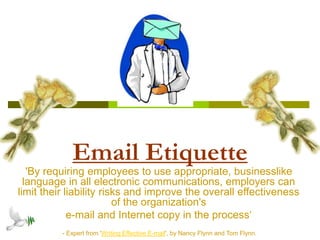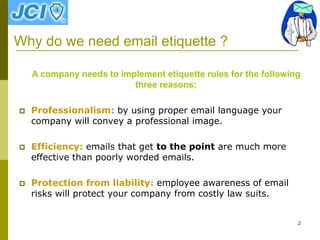E Mail
- 1. Email Etiquette 'By requiring employees to use appropriate, businesslike language in all electronic communications, employers can limit their liability risks and improve the overall effectiveness of the organization's e-mail and Internet copy in the processŌĆś - Expert from 'Writing Effective E-mail', by Nancy Flynn and Tom Flynn.
- 2. 2 Why do we need email etiquette ? A company needs to implement etiquette rules for the following three reasons: ’ü░ Professionalism: by using proper email language your company will convey a professional image. ’ü░ Efficiency: emails that get to the point are much more effective than poorly worded emails. ’ü░ Protection from liability: employee awareness of email risks will protect your company from costly law suits.
- 3. 3 What are the etiquette rules ? ’üČ Do not use email to discuss confidential information. ’üČ Use a meaningful subject. ’üČ Be concise and to the point. ’üČ Use proper spelling, grammar & punctuation. ’üČ Answer swiftly. ’üČ Do not attach unnecessary files. ’üČ Use proper structure, layout & Signatures.
- 4. 4 ’üČ Do not overuse the high priority option. ’üČ Do not write in CAPITALS. ’üČ Don't leave out the message thread. ’üČ Add disclaimers to your emails. View ’üČ Read the email before you send it. ’üČ Do not overuse Reply to All. ’üČ Mailings > use the bcc: field. What are the etiquette rules ?
- 5. 5 What are the etiquette rules ? ’üČ Do not forward chain letters. ’üČ Do not request delivery and read receipts. ’üČ Do not copy a message or attachment without permission. ’üČ Avoid using URGENT and IMPORTANT. ’üČ Avoid long sentences. ’üČ Don't reply to spam.
- 6. 6
- 8. 8 DISCLAIMER: ============================================ This email is intended only for the addressee named above. If you received this message in error, you must not disclose, copy or take any action in reliance of this transmission. Please notify us by return and delete the item. The message represents the personal views and opinion of the individual sender and under no circumstances represents those of FASCEL Limited. The shareholders, directors and management of FASCEL Limited or any of the Group Company accept no responsibility and accordingly shall have no liability to any party whatsoever with respect to the contents of this message BACK







